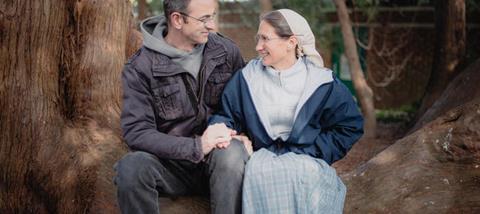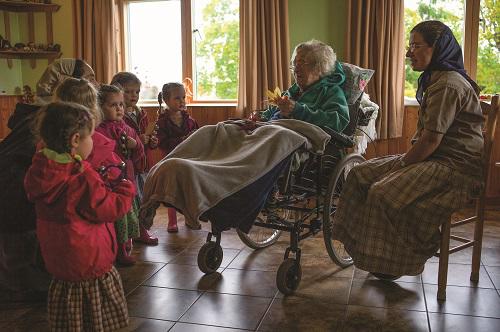Megan Cornwell spends 48 hours with the Christian community where all possessions are shared, faith sits at the centre of daily life and crime is nonexistent. But is this mere escapism, or a much-needed return to the model the early Church gave us?

In a quiet village in East Sussex, at the bottom of a winding country lane, past carefully tended orchards and surrounded by lush foliage and several fields, live a remarkable group of Christians. Basing their lives on the early Church as described in the book of Acts, 300 “brothers and sisters” have given up all they own to live a simple Christ-centred life.
Darvell is one of 23 intentional communities around the world under the auspices of the Bruderhof: 2,900 Christians from the Anabaptist tradition who believe God has called them to live separate and holy lives. Residents at Darvell have recently opened their doors to journalists: a decision they haven’t made lightly or for more than two decades, and I’m one of the fortunate ones with the opportunity to observe their unique community. For the next 48 hours I will be living with Bruderhof members Bernard Hibbs, his wife, Rachel, and their three children: Esther, Michael and Jonathan (pictured, above) to gain an insight into how and why they have chosen to eschew modern 21st-Century Britain as we know it and live in this radical, alternative way.
The fellowship of believers
When Bernard picks me up from Robertsbridge station in one of the eight shared vehicles that his community owns, the first thing I’m struck by is his ascetic appearance. He’s not covered head to toe in a cassock, but his shaved head, brown hoodie and dark, simple clothes remind me of a Catholic Capuchin friar. He speaks calmly and deliberately, and my frenetic, breathless stream of consciousness feels out of place. As we turn onto the road that leads to Darvell, I realise that Bernard’s simple sartorial choices are effectively the dress code of the Bruderhof. Men here wear basic jeans and plain T-shirts; women wear shirts, long skirts and head scarfs (following Paul’s advice in 1 Corinthians 11:1-16 and 1 Timothy 2:9). The young girls are adorned with ankle-length plaid dresses and with plaits in their hair. Some might draw comparisons with Little House on the Prairie.
Bernard has lived at Darvell for 25 years. He joined the Bruderhof with his family as a nine-year-old after his parents grew dissatisfied with the charismatic church they were part of. Nevertheless, it took three years to transition and give up their former way of life, visiting regularly to discern if they were called to a lifelong commitment to live in community and share everything they owned. All Bruderhof members take vows of poverty, chastity and obedience (including relinquishing their private property and savings), so it’s not a decision one makes lightly or quickly, but as a child, Bernard says he was eager to start his new life: he cried every time they departed because he missed the Bruderhof so much.
It’s easy to see why Bernard and Rachel love living here. The surroundings are beautiful, safe and serene and their children have an enviable upbringing, sheltered by countryside and with access to an Ofsted-rated ‘Good’ school (replete with Christian values and just a stone’s throw from their home). They live next door to their friends, and Esther, Michael and Jonathan enjoy opportunities many British children never get (regular camping trips, horse riding and daily swimming in their on-site lake, to name just a few). What’s more, it’s all free. One of the promises the community makes is to reject mammon, so no money changes hands at Darvell. Everyone works, but not for a salary. The Bruderhof run a successful business that produces quality furniture and toys for nurseries and schools. They sell these products to the outside world and last year made a profit of £7m from their UK activities alone. This is invested back into the three Bruderhof communities in England (the other two are in Peckham, London, and Nonington, Kent). A proportion is also given away.
“What happens in general society is that people with the most resources are the ones who get what they need,” explains Bernard, when we sit down to discuss life inside and outside Darvell. “There are some people who need a lot more who get almost nothing because they haven’t got the resources or the social network to obtain those things.” In Darvell it’s the opposite, he says: “Everyone gives what they can and receives all they need.” In many ways it’s a modern utopia. The community is efficient and sustainable (much of their food comes from their small farm and vegetable patches), the divorce rate is nonexistent, crime is committed infrequently by outsiders and the sick and disabled are looked after and valued. I see evidence of this as I tour the grounds with Bernard who points out the children with additional needs who have one-to-one support and care packages that would cost thousands of pounds in the ‘real world’.
Daily life
Life at Darvell has a daily rhythm that pulsates between family time, work, meals and worship.
Bernard’s parents live in an adjoining apartment, sharing a decent-sized kitchen in the huge converted former hospital that makes up one of the six shared houses on the 200 acre estate. The whole community meets at regular intervals for cups of tea and coffee and for a shared meal in the communal dining room at midday; children spend an hour at home after lunch before returning to school in the afternoon. Everyone gathers together again in the evening for worship and a brief reflection.
When we wake early to have breakfast together, I’m struck by the difference in our morning routines. Many of the residents start their day at 6am in order to enjoy a leisurely cooked breakfast before work and school begins. Because no one owns TVs or smartphones, and because computers are reserved for those who require them for their jobs, the children aren’t distracted as Bernard begins to read a passage from scripture and pray. Later on, when I’m taken on a tour of Darvell, I’m impressed by the orderly way in which everything appears to be run. People can ask to work in a variety of places: from the publishing house (where they produce Christian literature and their quarterly magazine, Plough), to the farm, in the kitchen, as teachers in the school, in the factory making toys and furniture, as physiotherapists, nurses or doctors in their on-site GP surgery, to plumbers, electricians, mechanics, builders, lawyers, dentists, accountants, artists and sales people. Everything seems to have been well-thought through and designed, down to the eco-friendly, cutting-edge woodchip system that provides residents with hot water.
On the surface this seems to be a picture-perfect Christian community, but Bernard is the first to admit that they are a group of “sinners rather than saints”. One of the reasons they have overcome some of the difficulties that have beset and destroyed similar movements is because they insist on no gossip and following the disciplinary model set out in Matthew 18:15-17, where Jesus says that if your brother or sister sins against you, go to them. Bruderhof members challenge and correct each other’s behaviour, but when I ask Rachel how this works on a practical level, she explains that most disagreements can be resolved before they escalate and without involvement from the wider church.
“If someone persists in behaviour that doesn’t fit into the church then, of course, at some point there would have to be a separation,” says Bernard. “We would try everything to make that person realise their behaviour is not fitting for a disciple. But eventually, if someone persists like that, we would ask them to leave.” The Bruderhof don’t excommunicate people and they would support anyone who wants to leave of their own volition, but it’s clear that while residents love and serve one another wholeheartedly, no individual comes before the whole.
“To make a community work, there has to be a certain amount of submission to each other,” says Bernard. “You have to do things that are good for the community, not just for yourself. So if you can give up that selfishness, then actually life seems to work pretty well.” For Bernard, denying the self has been one of the hardest things about life at Darvell; sacrificing wealth and personal belongings was the easy bit, he says, with a wry smile.
Since living at Darvell the Hibbs family have been asked to move 13 times, including twice overseas, in order to accommodate other growing families and because their skills were needed. “We have to move around,” says Bernard, matter-of-factly, when I ask him about this. “People’s skills are needed in different places and we should be willing to move for the sake of Christ.” In a society where autonomy reigns and ego is king, this mentality is difficult to grasp.
The relationship between the individual and the whole community surfaces again when I discuss the Bruderhof’s maternity policy. Bernard tells me women take six weeks off after giving birth and then put their babies into the Darvell nursery and return to work (albeit a phased return with regular breaks for feeding). I’m shocked and somewhat surprised to hear this, assuming that a community with traditional Christian values would promote women staying at home to raise their children. Rachel is convinced that this model worked for both her and her babies, but she admits she wondered at the time how she would “give him up” when it came to putting Michael into nursery. I can’t help wondering who makes decisions like this and why.
But Darvell isn’t all it seems, and even as I ponder how Christian women outside this community might view the situation, I hear a different story from the women living here: that they feel more free than ever; that the clothes they wear eliminate the endless deliberation over their wardrobes in the morning; that their headscarves enable them to declare to the world they are set apart for God; and that their long skirts and bare faces help them follow the Bible’s commands for women to dress modestly.
Becoming a member
Young people at Darvell are encouraged to explore life outside the community once they reach their late teens in order to make an informed decision before taking their vows and becoming lifelong members at 21. Many of the Bruderhof youth have been on this journey and roughly 70 per cent choose to stay. While this seems like an eminently sensible way of ensuring residents actually want to be here, I can’t help wondering whether it really is a choice. If all you’ve known is the safety and security of Darvell then of course the outside world will seem overwhelming and frightening.
I ask Marcella, a 21-year-oldthird generation Bruderhof resident currently ruminating over her options, whether she feels equipped for life outside. “I absolutely do,” she says. “We’ve had many young people who have left and who are extremely successful. I think basically it’s because our kids grow up with a strong work ethic and amazing schools that are very rigorous academically. Also it’s just very wholesome. We know how to work hard, how to play hard, you learn honesty, which is huge in the workplace, integrity. Even the ability to stay focused on a task...I have a phone, obviously, when I’m at school, but I don’t have Facebook on it, with all those distractions. I come home and write an essay but I don’t have all these draws: I don’t have the pressure of going out to a nightclub every night and doing all these crazy things. I can focus on my work.”
Marcella is currently living in the Bruderhof residence in Peckham, while she studies history and comparative literature at Queen Mary University. She is back at Darvell for the summer break. Although she isn’t 100 per cent sure whether she will take her vows and become a lifelong member, she tells me she is leaning towards staying. “Obviously you can’t live here unless you’re really sure about it.
“I’ve been doing lots of praying and obviously living in London has given me exposure to wider society and other options I could have, but the values I have grown up with have stayed with me, definitely, and even if I didn’t stay I would keep those values, I’m sure.”
Standing out
In the evening, after a light dinner at the shared log cabin a few minutes’ walk from the Hibbs’ home, Rachel and Bernard invite some friends over and we stay up late sharing stories, drinking wine and eating chocolate. It’s a far cry from what I expected to be doing when I first arrived at Darvell. I’m touched by how freely they have welcomed me into their family.
As I prepare to leave the community the following day, a familiar feeling washes over me. It’s feeling I’ve had before when I’ve been surrounded by Christians at a festival or while away on a retreat or church weekend: I don’t want to go. When you spend a fair amount of time with lots of people truly seeking to follow Christ and love one another, you get a glimpse of what the kingdom of God could be like; it’s incredibly affirming and attractive. The peace, the safety, the joy, the simplicity – all of which are anathema to my city environment– feel somehow as it should be and, of course, as it will be.
As I jump onto my London-bound train I already sense the peace ebbing away as an indignant woman sitting behind me jabbers on to her husband and the incessant announcements on the tannoy disrupt my unfurling thoughts. I open my phone and a distressing news story about women being sexually abused in nightclubs in South Korea pops up. It feels like rudely waking up in a dystopian world.
The Bruderhof have discovered a Church model that helps Christians obey what we’re told in James 1 is a crucial element of religion that God our Father accepts as “pure and faultless”: “to keep oneself from being polluted by the world”. They have learned how to live in submission to one another and have much to teach the UK Church about discipleship. I agreed with a lot of Bernard and Rachel’s outlook on life, and during my 48 hours with them had many of my questions answered and most of my misconceptions dispelled. But as I arrive home to the bustle and bolshiness of the capital, I can’t shake the feeling that as Christians we’re called to be salt and light in among the mess, no matter how challenging (Matthew 5); after all, Jesus himself said he came for the sick and not the healthy (Mark 2:17).
When I get back to work I send Bernard an email thanking him for having me and asking him for some information about baptisms at Darvell. Happily I find that since the beginning of 2019 four people have become Christians at the community, but when I ask how many of those were formerly of other faiths or none, the answer comes back: zero. What about in the last few years? Have they had any unbelievers come to know Christ and join? “No”, replies Bernard.
The Bruderhof is clearly a wonderful example of Christian community that seems to appeal to people already going to church but looking for a more authentic, countercultural experience. If we are to see people saved and added we’ve got to be willing to go out into the world and preach the good news. But, as Bernard rightly pointed out: “If people come to the church and yet can’t really see the difference...is that really what Christ wanted?
A BBC One documentary, Inside The Bruderhof, will be broadcast on 25 July at 10:35pm
Photos: Danny Burrows & Toby Lloyd






































